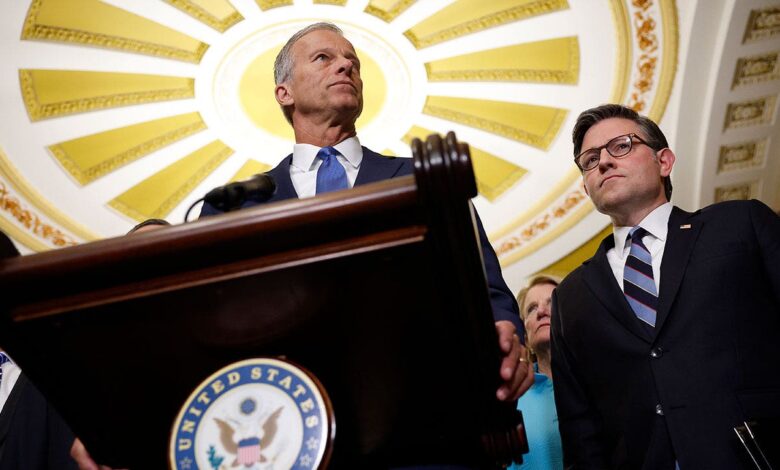How closed-door negotiations and a guarantee ended the longest US government shutdown in history

NEWYou can now listen to Fox News articles!
Several weeks after the government shutdown, the idea of reopening seemed impossible.
Senate Republicans and Democrats remained entrenched in their positions for 41 days and 40 nights, and neither side wanted to appear to be giving in to the other.
Senate Minority Leader Chuck Schumer, D-N.Y., and his caucus wanted a guaranteed deal on the expiration of Obamacare subsidies, while Senate Majority Leader John Thune, R-S.D., argued that the government must first reopen.
THE CAVE OF SENATE DEMOCRATS, AN OPEN PATH TO THE REOPENING OF GOVERNMENT

Senate Majority Leader John Thune, R-S.D., accompanied by House Speaker Mike Johnson, R-La., speaks to the media following the Senate Republican Policy Luncheon at the U.S. Capitol in Washington, Oct. 7, 2025. (Kevin Dietsch/Getty Images)
But a burst of bipartisan talks, driven by outside pressures such as unpaid federal workers, threatened federal food benefits and crippled air travel, has reinvigorated a task force of senators to build a path out of the historic shutdown.
The result was a bipartisan agreement that included a trio of spending bills intended to jumpstart the government funding process, an extension of the original continuing resolution (CR) passed by the House until January 30, 2026, to allow time to fund the government the old-fashioned way, and a renewed guarantee that Senate Democrats would get their vote on expiring Obamacare subsidies.
Ultimately, the shutdown lasted 43 days, with the decisive vote to end it and send the package to the White House taking place in the House on Wednesday.
House Appropriations Committee Chairman Tom Cole, R-Okla., who helped craft the final spending deal, said discussions on those three bills began “well before” the shutdown.
“We’ve certainly had some thorny issues, a hemp issue, disagreements over funding levels and all that. But for the most part, we’ve resolved those issues. And I will tell you on our side and I guess the other, the three big players were the cardinals themselves,” Cole said, referring to the three House Republican subcommittee chairmen who led the discussions on the three individual bills.
DEMOCRATIC LEGISLATOR BLASTS SENATE COLLEAGUES FOR CAVE IN SHUTDOWN AGREEMENT

Sen. Jeanne Shaheen, D-N.H., speaks during a news conference with other Senate Democrats who voted to restore government funding in Washington on Nov. 9, 2025. (Nathan Posner/Anadolu via Getty Images)
“Our Democratic colleagues who voted against the bills contributed a lot to the bills. The real question will be in the next package: Can you bring in votes? If you don’t bring in any votes, our negotiations will be a waste of time and we will have to build an all-Republican coalition.”
Still, most of the eight Democratic senators who crossed the aisle viewed securing a vote on Obamacare as a turning point, even if it lacked the guaranteed outcome sought by Schumer and the caucus majority.
“There was no vote on the Affordable Care Act premium tax credits,” Sen. Jeanne Shaheen, D-N.H., said Sunday, referring to Obamacare. “We have a guaranteed vote on a guaranteed date on a bill that we will write, not that the Republicans will write.”
SENATE VOTE TO END GOVERNMENT SHUTDOWN TRIGGERED DEMOCRATIC CIVIL WAR

Sen. Tim Kaine, Democrat of Virginia, speaks to reporters before the Senate Democratic Caucus lunch meeting at the U.S. Capitol, Nov. 6, 2025. (Bill Clark/Getty Images)
For Sen. Tim Kaine, D-Va., who cast the decisive Democratic vote that sealed the deal on the proposal in the Senate, these were provisions that would rehire and protect workers laid off by the Trump administration.
Kaine recalled that it was only hours before the Senate took a key test vote on the CR that he changed his mind. Until then, the White House had not wanted to include text that would have canceled the reductions in force (RIF) ordered at the start of confinement.
But it was through Sen. Katie Britt, R-Ala., who was a key negotiator in the Senate, that Kaine gained buy-in from the White House.
“I said, I’m no if you don’t do that, I’m no, and you know it was 4:45 p.m. on Sunday when they told me they would do that,” he said.
CLICK HERE TO DOWNLOAD THE FOX NEWS APP
Kaine noted that with 320,000 federal workers in Virginia and 2 million nationally, he acknowledged it was a big ask.
“And I told her, and when I explained it to her, she said it was a reasonable request, but the White House didn’t want to do it,” he said. “And she was a bit of a go-between and helped me.”



